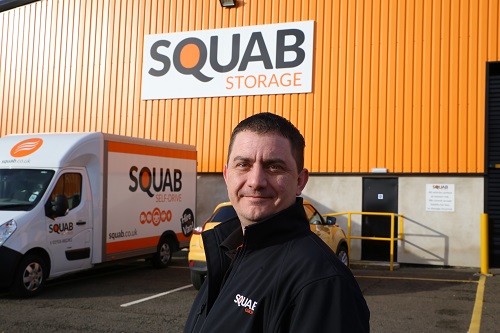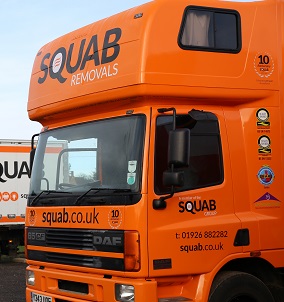By Steve Jordan. It was over four years ago that I last interviewed what was then Britannia Squab in Warwickshire. Since then a lot has changed. I was intrigued to find out what and why.

I always find the name of the company amusing: Squab. Emlyn Evans comes from a farming family and the moving, self storage and document storage company is located on the family farm. A Squab is a baby pigeon which, for farmers at certain times of the year, must be absolute pests. Ironic, then, that the moving company that bears the name of an arable nuisance has been such a success for them.
When I interviewed Emlyn in 2011 he said that, after all the developments they had made recently, the company would be entering a phase of consolidation. Well that clearly didn’t work. The place was almost unrecognisable since the last visit.
There were still shells of warehouses in the final build stages, but these were not the same as before. The new ones from last time, were full. What had been a milking parlour had been transformed into very smart offices, a Conference Room and a training facility. The old offices had been converted into cottages for weekly rent to local businesses. There were new tenants too: a moving and a logistics company.
But the biggest change was the distinct lack of red and blue paint. Everything was now a fetching shade of orange. Very smart. But the Britannia branding, of which Emlyn had been so proud such a short time previously, had gone. But why?
Ray Marshall is now the operations manager leaving Emlyn to work on the business rather than in it. “The company evolves year on year,” he said. “Nothing sits still here. Emlyn always has a project to work on. He has a passion for growth.”
 Squab joined Britannia in 2007. At that time Squab’s sister company, Box-it Central was providing document storage services in addition to Squab’s self storage facilities but the moving side was very small: just limited to the work the storage side created. Joining Britannia was a good decision. “We wouldn’t be where we are now were it not for Britannia,” said Ray. “We learned everything we know about removals from them. We wouldn’t have expanded so quickly without their help.”
Squab joined Britannia in 2007. At that time Squab’s sister company, Box-it Central was providing document storage services in addition to Squab’s self storage facilities but the moving side was very small: just limited to the work the storage side created. Joining Britannia was a good decision. “We wouldn’t be where we are now were it not for Britannia,” said Ray. “We learned everything we know about removals from them. We wouldn’t have expanded so quickly without their help.”
After nine successful years as Britannia members, leaving was a major decision. Squab would lose the enquiries that came from the central office, would lose the military work from the Agility contract and would lose the import work that their exports generated. They would also lose the family security of being part of a group and there was the inevitability that another Britannia member would move into their area. Then there were all the costs of rebranding. But the draw of independence was too strong.
Britannia companies operate within a defined geographical area. “We were very aware that being a Britannia member gave our customers and our staff confidence,” said Ray. “But we wanted to expand. We have a rich area about 20 miles away around Solihull and the Cotswolds on the doorstep. We couldn’t touch those areas.”
Making the decision to leave was difficult. Not only would it potentially give the customers the wobbles but it would affect the staff. How would they react when the red, white and blue security blanket was removed? “It needed the staff to have confidence in the management that we were making the right decision and their jobs were not in jeopardy,” said Ray. “But it also needed the management to have confidence in the staff that the whole team was strong enough to get through the difficult times. We would not have been able to do it if the workforce hadn’t been tough enough.”
As it turned out, they need not have worried. Yes, some work has been lost but it has been replaced by work from the other areas. Squab has developed a strong working relationship with John Mason for shipping. This is a developing area for the company but it is a way off from handling its own groupage for now. Maybe next time I visit there’ll be six loading bays! But, most valuable of all, perhaps, is that the relationship with Britannia and its members has not been soured. “We had a very happy relationship with Britannia, and still do,” said Ray.
 The truth is, Squab would have done well with or without Britannia but, maybe not as quickly. It was right for the company at the time, but things change. Today Squab & Box-it have around 130,000 sq ft of storage including 178,000 document boxes; they hold the British Standard 15713 for Secure Destruction of Confidential Material; have a shredding truck to securely destroy confidential material at the customer’s site; getting on for 1,000 pallet boxes; and 400 self storage rooms all fitted out by Steel Storage. There’s another self storage warehouse being built ready for when families move into a new housing estate only a mile or so away. Ray puts some of the success of the self storage down to TV with the popularity of programmes such as Storage Hunters and Container Wars making self storage fashionable.
The truth is, Squab would have done well with or without Britannia but, maybe not as quickly. It was right for the company at the time, but things change. Today Squab & Box-it have around 130,000 sq ft of storage including 178,000 document boxes; they hold the British Standard 15713 for Secure Destruction of Confidential Material; have a shredding truck to securely destroy confidential material at the customer’s site; getting on for 1,000 pallet boxes; and 400 self storage rooms all fitted out by Steel Storage. There’s another self storage warehouse being built ready for when families move into a new housing estate only a mile or so away. Ray puts some of the success of the self storage down to TV with the popularity of programmes such as Storage Hunters and Container Wars making self storage fashionable.
Squab has also introduced a van hire service with five very smart vans ready for customers to use to bring goods into store or handle DIY moves. The whole Squab fleet is now dressed in its striking orange livery. The company employs 49 people, up by around 40% since my last visit. So much for consolidation, Emlyn.
But the biggest change is the opening of the new 20,000 sq ft, 400-room, Squab self storage facility at Daventry in April last year with Tim Redding as its sales storage supervisor. Although this site doesn’t handle removals, it would not have been possible for Squab to expand into this new area while remaining in Britannia.
So are there any regrets about leaving Britannia? Although Emlyn is very grateful to the group for the help his company received while in membership, he feels the positives outweigh the problems. “It’s easy to become lazy when you are in a group because business comes in,” he said. “It worked perfectly when we started, but the time was right for us to move on. Now we need to be a bit more hungry.”
I shall mark my diary to go back in another four years to see how Squab is getting on. If the rate of progress over the previous four years is anything to go by, when the company was supposed to be standing still for a while, I can’t imagine what I might find.